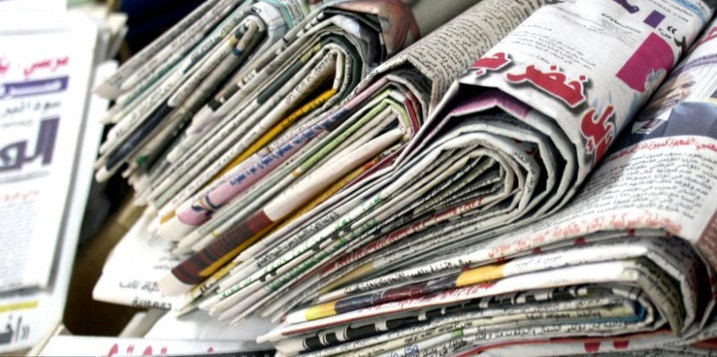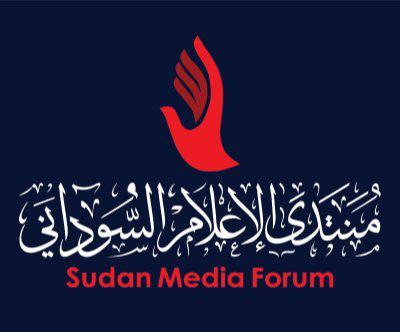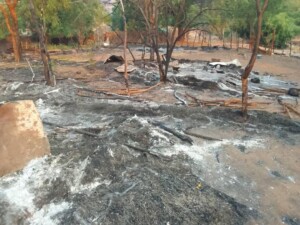A government initiative for the return of the Sudanese press – An attempt to revive or a plan to domesticate the media?

Sudanese newspapers (File photo: RD)
Compiled by Sudan Tribune for Sudan Media Forum joint newsroom
As a result of the war that has erupted between the army and the Rapid Support Forces (RSF) since April 15, 2023, more than 20 newspapers in Sudan have stopped publication, plunging the country into a dark information darkness and obscuring from the world the truth of what is happening in Sudan.
This halt was expected due to the massive destruction of press institutions and printing presses operating from the capital, Khartoum. In light of this devastation, hundreds of journalists have found themselves displaced and refugees, while many have been forced to abandon their profession and turn to marginal jobs to support their families.
In this reality that has befallen journalists and newspapers, the government intends to resume the publication of newspapers.
Informed sources revealed to Sudan Tribune that the Khartoum state government has begun actual preparations to resume the publication of newspapers. According to the sources, meetings were held last July between a newspaper distributor appointed by the authorities and a number of publishers, with the newspaper “Al-Tayyar” owned by its owner Othman Mirghani being one of the first newspapers to confirm its readiness to return.
The outbreak of the war was a surprise to everyone, including readers, and even to publishers and editors. That morning, newspapers ran headlines reflecting last-minute efforts to defuse the crisis, such as “Jibril, Minawi and Agar lead mediation” and “The international community expresses concern over military escalation.” These headlines, ironically, were themselves proof that the specter of war was already hanging over the country.
From pens to sidewalks. A humanitarian disaster in numbers
Walid al-Nur, secretary of social affairs at the Sudanese Journalists Syndicate, presents a bleak picture in numbers, confirming to Sudan Tribune that all media institutions, including 26 paper newspapers and 5 printing presses, have been shut down since the first day of the war.
Of the 1,500 journalists in the private and public sectors, 90 per cent will be out of work by August 2025. He adds, “Only 10 per cent of journalists are still working, and everyone has lost their savings, and some have turned to street vendors or other jobs to provide for their families.”
Only 5 per cent of journalists, most of whom work for international satellite channels and news agencies, are regularly paid, he said. He strongly criticised the lack of attention of press and international institutions to Sudanese journalists, whether in terms of protection or support, compared to the attention of their counterparts in other conflict zones around the world. He adds, “The issues and suffering of Sudanese journalists have not been addressed in the media in a way that reflects the scale of the real disaster.”
Heavy losses and hope for a return
The editor-in-chief of Al-Tayyar newspaper, Othman Mirghani, points out that the number of paper newspapers before the December 2018 revolution was about 40 different newspapers. He explained to Sudan Tribune that the media scene after the war has shifted to cyberspace, but with varying efforts, as some electronic newspapers are edited by one person with a mobile phone, while other newspapers such as Al-Tayyar have maintained their professional structure, staff, and daily editorial meetings.
Mirghani said that the financial losses of Al-Tayar newspaper alone amounted to about $400,000, following the complete destruction of its headquarters and the looting of all its equipment, including modern cameras and broadcasting equipment that were imported weeks before the war.
However, Mirghani seems optimistic about the possibility of returning to paper printing, telling Sudan Tribune that the army has a printing press that needs some maintenance to get back to work, and another printing press in Bahri that is ready, as well as the distribution company. He adds: “We have started preparing for the publication of the newspaper in paper.”
Government plan to return newspapers to printing presses
Government reports indicate that newspaper premises were not significantly affected structurally despite being looted, and that the Bakkah and CTB printing presses were equipped to operate. Sudan Tribune has learned that the editor-in-chief and owner of Al-Tayyar newspaper, Osman Mirghani, and the head of the Journalists’ Union, former captain Sadiq Al-Riziki, have been tasked with coordinating this return. Authorities also confirmed that they had prepared the printing paper and asked publishers to provide lists of the names of the journalists working for them.
The challenges of return. Fears of targeted journalism
However, the editor-in-chief of Al-Jarida newspaper, Ashraf Abdel Aziz, believes that this return is almost impossible under the current circumstances. Speaking to Sudan Tribune, he warns that any government aid will come at a high price in terms of encroaching on the independence of the press.
The biggest danger, according to Abdelaziz, lies in the issue of the government’s payment of journalists’ salaries. “If the government pays, it will certainly want to influence newspapers to serve its agenda,” he says. This could lead to the majority of newspapers becoming platforms for spreading hatred and supporting the tide of war, undermining their primary role in enlightenment.”
Abdel Aziz asserts that the current crisis has exceeded anything that preceded it, as the war has not only disrupted newspapers, but also “torpedoed their entire infrastructure; it has looted their offices, stolen their equipment, and even sold the iron of the printing presses in the scrap market.” Even the few newspapers that have been able to survive electronically, such as Al-Jareeda, Al-Sudani, and Al-Tayar, are operating at a very limited capacity.
Fundamental questions awaiting answers
The head of the Sudanese Journalists Syndicate, Abdel Moneim Abu Idris, supports the principle of the return of any media institution that will return journalists to their jobs, but in an interview with Sudan Tribune, he raises fundamental questions left by the government initiative: “Will the government fund these newspapers or the private sector? On what basis will new working relationships and contracts be built with journalists whose careers have been destroyed?”
He concludes by emphasising the magnitude of the challenge, recalling that newspapers and media outlets were among the first victims of the war, as they were destroyed and looted by up to 90 percent, making it an open and complex question to talk about how to return.
The Sudanese Media Forum and its member institutions publish this article prepared by Sudan Tribune, to discuss the possibility of reissuing newspapers on a government initiative, and the rationale for this in light of the destruction of the infrastructure and the killing, displacement and loss of property of journalists due to the ongoing war, and the extent to which the move reflects on the independence and professionalism of newspapers.
This article, compiled by Sudan Tribune, is published via the platforms of the Sudan Media Forum and its member institutions to discuss the possibility of reissuing newspapers on a government initiative, and the rationale for this in light of the destruction of the infrastructure and the killing, displacement and loss of property of journalists due to the ongoing war, and the extent to which the move reflects on the independence and professionalism of newspapers.

#SilenceKills #الصمت_يقتل #NoTimeToWasteForSudan #الوضع_في_السودان_لايحتمل_التأجيل #StandWithSudan #SudanMediaForum











 and then
and then